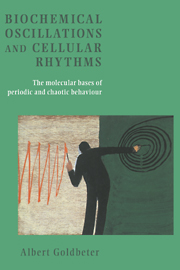Book contents
- Frontmatter
- Contents
- Foreword to the English edition by Michael Berridge
- Foreword to the French edition by Ilya Prigogin
- Preface
- 1 Introduction
- Part I Glycolytic oscillations
- Part II From simple to complex oscillatory behaviour
- Part III Oscillations of cAMP in Dictyostelium cells
- Part IV From cAMP signalling in Dictyostelium to pulsatile hormone secretion
- Part V Calcium oscillations
- Part VI The mitotic oscillator
- Part VII Circadian rhythms
- References
- Index
Foreword to the French edition by Ilya Prigogin
Published online by Cambridge University Press: 26 February 2010
- Frontmatter
- Contents
- Foreword to the English edition by Michael Berridge
- Foreword to the French edition by Ilya Prigogin
- Preface
- 1 Introduction
- Part I Glycolytic oscillations
- Part II From simple to complex oscillatory behaviour
- Part III Oscillations of cAMP in Dictyostelium cells
- Part IV From cAMP signalling in Dictyostelium to pulsatile hormone secretion
- Part V Calcium oscillations
- Part VI The mitotic oscillator
- Part VII Circadian rhythms
- References
- Index
Summary
It is a privilege to introduce the book of my friend and colleague Albert Goldbeter.
Our century has witnessed basic changes in direction in science, and foremost among them I would place the ‘rediscovery of time’. Only a few decades ago, most of the research efforts in physical chemistry were devoted to equilibrium states. Not only did the notion of equilibrium dominate chemistry, but it was also considered to be the fundamental paradigm for the extension of scientific ideas to other fields, including economics and social sciences. The arrow of time was considered to be an artefact reflecting human ignorance. Today, the situation has radically changed. Everywhere, from astrophysics to biology, the essential role of nonequilibrium is well recognized.
It is indeed far from equilibrium that we encounter self-organization processes that lead to the breaking of temporal and spatial symmetries as well as to the appearance of coherent behaviour on a supramolecular scale. Chemical oscillations provide a particularly striking example. I remember my astonishment when I was shown for the first time a chemical oscillatory reaction, more than 20 years ago. I still think that this astonishment was justified, as the existence of chemical oscillations illustrates a quite unexpected behaviour. We are used to thinking of molecules as travelling in a disordered way through space and colliding with each other according to the laws of chance.
- Type
- Chapter
- Information
- Biochemical Oscillations and Cellular RhythmsThe Molecular Bases of Periodic and Chaotic Behaviour, pp. xix - xxiiPublisher: Cambridge University PressPrint publication year: 1996



